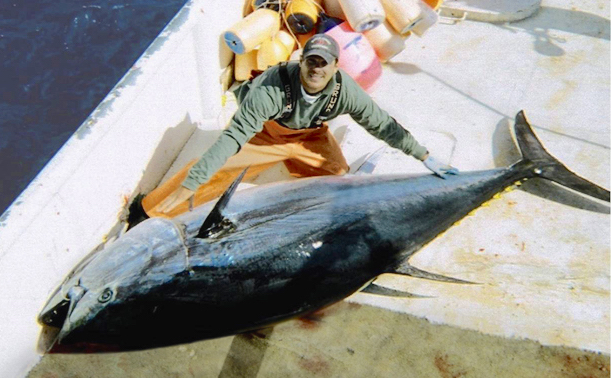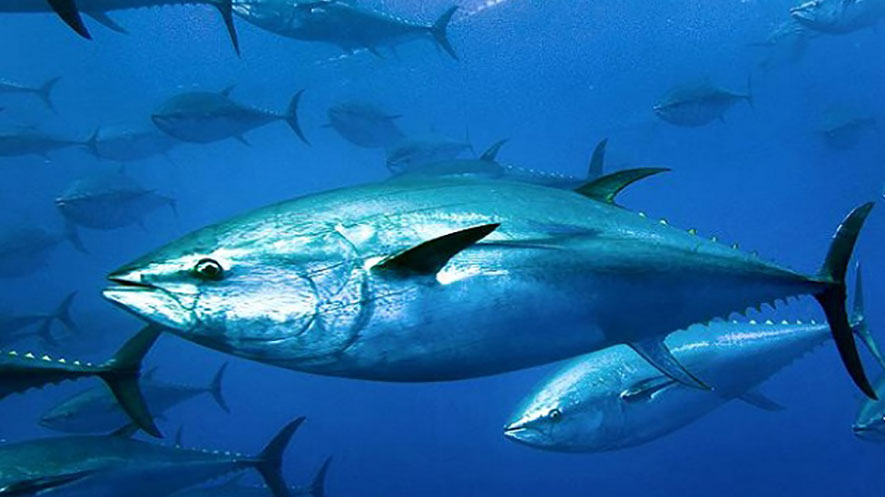A ground breaking two-year scientific study is now underway in the UK that will deploy state-of-the-art animal tracking devices to discover the movements of the elusive Atlantic Bluefin Tuna and confirm the return of a population to British waters after disappearing over 25 years ago.
Atlantic Bluefin Tuna are known for being among the biggest, fastest and most valuable fish in the sea. Once a common sight off the UK coast, ranging throughout the Celtic and North Sea, they largely disappeared from British waters in the 1990s generally attributed to overfishing. Now recognized as an endangered species, in recent years they have been observed more frequently in UK coastal waters, particularly during the late summer, autumn and winter as they move into coastal areas to feed on energy rich fish such as sprats and herring.
 By Unknown -FishWatch (see Gallery), Public Domain. Source: Wikipedia
By Unknown -FishWatch (see Gallery), Public Domain. Source: Wikipedia
Equipped with torpedo-shaped bodies, Atlantic Bluefin are built for speed and can travel over huge distances, crossing both shallow coastal waters and the deep ocean. Yet despite historic evidence, scientists know little about their movements including how long they stay in British waters and where they go once they leave the coastal environment.
Supported by the UK’s Department for Food, Environment and Rural Affairs (Defra) and the European Maritime and Fisheries Fund, researchers from the University of Exeter and the Center for Environment, Fisheries and Aquaculture Science (Cefas) will begin work to improve our knowledge about the species. The study is an important first step for securing a positive future for Atlantic Bluefin Tuna around the UK.
“This a ground-breaking project for the UK and another important step towards the use of evidence-based approaches for marine conservation. These are huge, exciting top predators, yet with an uncertain future. We are incredibly excited to be able to work on these fish, which I suspect to many conjure thoughts of tropical warm waters, yet they are here in our coastal sea. The next few years will be challenging, exciting, yet hugely revealing regards their movements and biology,” said Dr. Matthew Witt, lead scientist on the project for the University of Exeter.
Scientists will be working with stakeholders including commercial fishers, recreational anglers, wildlife watchers, and NGOs to share knowledge and to deploy around 40 satellite tracking devices. The work will help scientists to understand where and when Atlantic Bluefin Tuna are found in British waters; track long-distance migrations; discover possible breeding grounds; and observe interactions between Atlantic Bluefin and both commercial and recreational fisheries. The information will improve knowledge on this valuable and endangered species, ultimately aiding in conservation measures into the future.
Dr. David Righton, lead scientist on the project for Cefas, said “This exciting collaboration will enable us to gather and share knowledge of this incredible species, and uncover the role they play in UK waters. Cefas has a long history of investigating the behaviors and migrations of many species of fish, and we’re looking forward to using our expertise to address some of the fundamentally important questions that need answering about bluefin tuna. The enthusiasm of the people that came along to the project launch was terrific, and it give us all great hope that the scientific data that the tagging programme will bring can combine with the observations and information of fishers, sailors, observers and anyone else who spends their time close to the sea.”
The project, named THUNNUS UK, was officially launched at the Environment and Sustainability Institute at the Penryn Campus of the University of Exeter. More than 40 stakeholders met with the project team to learn more about the species, discover how the project will help fill the knowledge gap and ensure the protection of Atlantic Bluefin as we try to avoid past mistakes that might have led to their disappearance decades ago.
Quick Facts
Common Name: Atlantic Bluefin Tuna
Scientific Name: Thunnus Thynnus (Linnaeus, 1758)
Average Life Span in The Wild: 7-13 Years
Average Size: 6.5 Ft
Average Weight: 550 Lbs
IUCN Red List Status: Endangered
Current Population Trend: Decreasing



